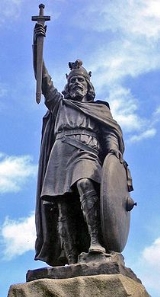A statue of him sits in Wantage market place.
replied to: mordinho
Replied to: A statue of him sits in Wantage market place.
His reforms formed the basis for the creation of modern England.
replied to: mordinho
Replied to: A statue of him sits in Wantage market place.
When Alfred was born in 848/9 at Wantage, Anglo-Saxon England was made up of Northumberland, Mercia, East Anglia and Wessex itself. By the time he came to the throne in 871, Northumberland and East Anglia had been overthrown by Danes who ow ruled both countries. In 874, Mercia fell, leaving Wessex as the last remaining Anglo-Saxon kingdom. In 878, the Vikings (Danes) attacked, forcing Alfred to flee to Somerset, which was then a virtual wilderness. He rallied his forces four months later and beat the Danes in the critical battle of Ethandun. The Danish king, Guthrum, retreated to East Anglia and left Alfred with Wessex and half of Mercia. Without Alfred, the Danes would have occupied the whole of England, and the Anglo-Saxon culture and the English language would have died out completely. His first legacy is therefore the English language.
Second, Alfred began a mini-renaissance of education, especially of reading, which he spread across the kingdom, first by requiring the aristrocracy to learn to read and by translating personally four religious books of the day from Latin into English.
Third, he created the first 'English' army in history.
Fourth, he was the father of Edward the Elder and Ethelflaed and grandfather of Athelstan, all of whom played their part in recovering Anglo-Saxon territory from the Danes until Athelstan eventually ruled all Britain - incuding Scotland and Wales.

